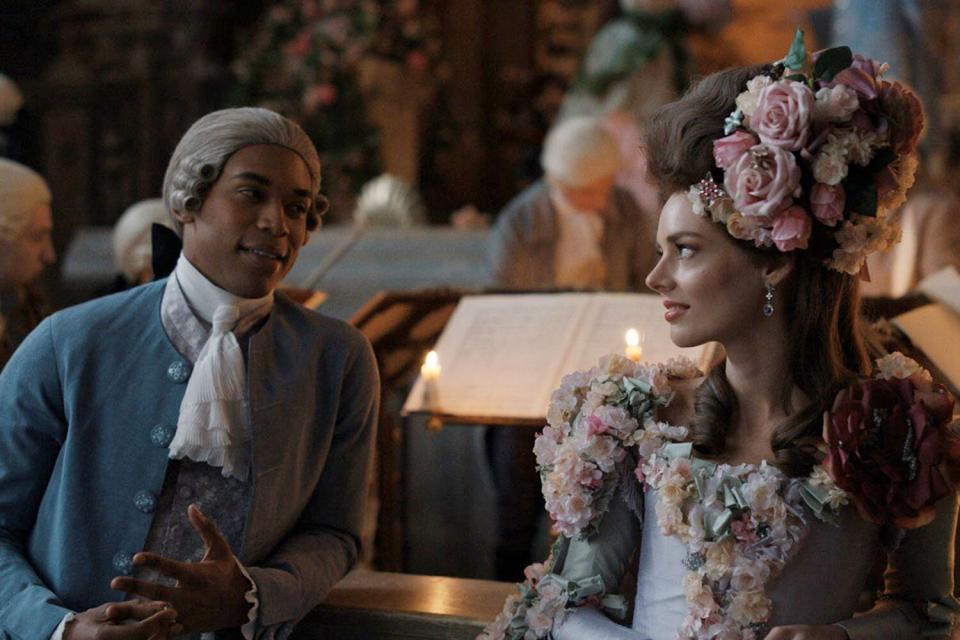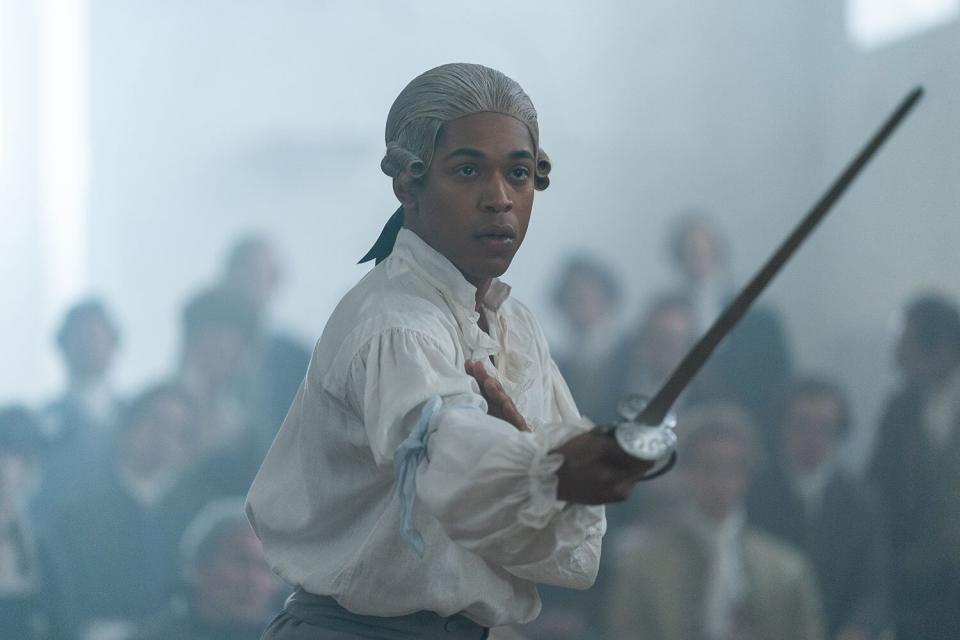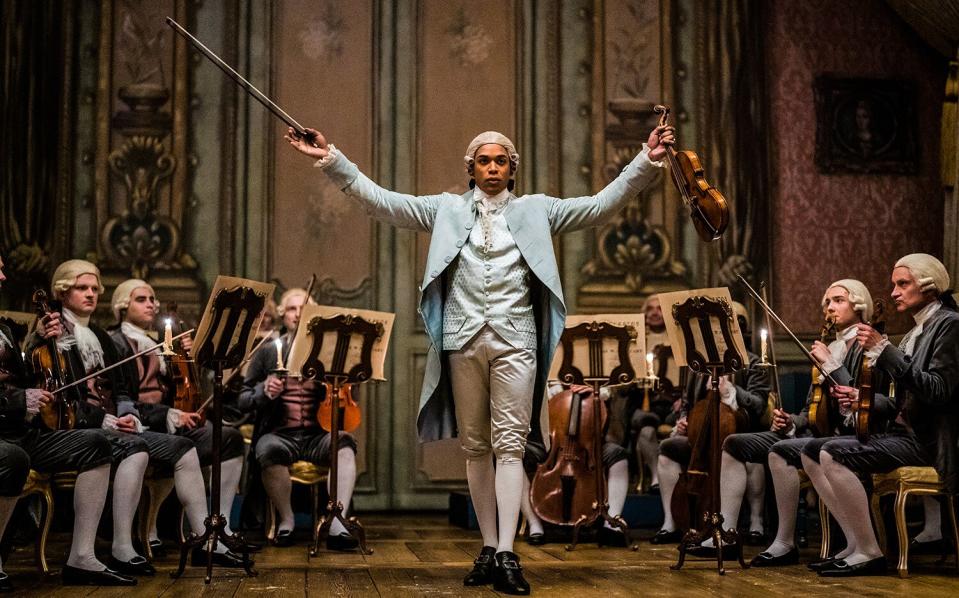Chevalier 's Kelvin Harrison Jr. tried to find the 'sexy' in playing its classical music 'rock star'

- Oops!Something went wrong.Please try again later.
Kelvin Harrison Jr. wasn't as nervous as one might think about scenes in his new 18th-century-set movie Chevalier, in which he shows up Mozart in the opening sequence with his masterful violin skills. Thanks to Harrison's own background playing various instruments, he knew what it took to convey composer Joseph Bologne, Chevalier de Saint-Georges' talents.
It was those darn sex scenes that had Harrison sweating.

Searchlight Pictures/20th Century Studios Kelvin Harrison Jr. and Samara Weaving in 'Chevalier'
"Any type of intimacy, being naked in a bed, it always gave me the heebie-jeebies: 'What's this gonna be like and how awkward is this gonna be?'" the actor tells EW. "I'm used to doing indies, and everything's really rough and raw. You barely have makeup on, and you're just like a [normal] person. And this movie's so pretty, so everyone's all done up. And I remember being like, 'Yo, can I just like lay in the bed normal?' And [director Stephen Williams] was like, 'You just need to find the light.' And so I'm laying on this pillow, acting like I'm an ingenue in this moment with Samara [Weaving] trying to be the prettiest period icon I could be in this sex scene."
Harrison laughs now thinking about it, but the anxiety was real during those scenes, important in setting the stage for the greater turmoil in Chevalier's life — as if he didn't have enough to overcome as the illegitimate son of a wealthy planter and a Senegalese slave who attended a school made up of all white students. And yet, the prodigy trained as a teenager in both music (he eventually wrote several symphonies, operas, string quartets, and sonatas) and fencing, becoming someone regarded at the time as the greatest swordsman in Europe.
"I was a little nervous only because they were nervous about seeing me do the fencing bouts," he say. "In the rehearsal, I didn't do it well and they were like, 'We're going to have to use the stunt double.' And I was like, 'Please, I'm good. I don't need the stunt double. I got this.' And then they saw me do it for real and they were like, 'Oh, yeah, he's better than his stunt double.'"
Below, Harrison chats with EW about taking a trip back in time to portray someone he considers a "rock star" of the period.

Searchlight Pictures/20th Century Studios Kelvin Harrison Jr. in 'Chevalier'
ENTERTAINMENT WEEKLY: So many aspects of Joseph Bologne's legacy and his work were destroyed — people, in essence, tried to erase him in many ways. So of the things that were documented at the time and that are still available today, what did you find most helpful in understanding who he really was?
KELVIN HARRISON JR.: Gabriel Banat wrote a book called Virtuoso of the Sword and Bow — that really became my bible for Joseph. It's like a game of telephone for the time; someone says a story and they tell the next person the story, and so it gets a little bit diluted at a certain point. But I will say, you start to take the big ideas: He was a dancer, so he was really comfortable with his body; or he was very androgynous, some people would say; or he was very handsome; or he was really popular with the older women. And so all these things are character traits. And so then as an actor, your job is to do a deep psychoanalysis of what that means. And then you place it in the context of France and the 1700s: Who was in power at the time, the laws at the time, trade at the time, the economic infrastructure at the time? And then you say, 'Well, how do I survive that?' And then you kinda play it like a video game… I'm in story mode, and I'm Joseph Bologne, and I'm doing this.
So what you're saying is, there were cougars even back then.
Oh yeah, definitely cougars, and we see one of them in the movie.
When he first arrives in France as a child, already a musical prodigy, Chevalier is warned about the racism he would face. Hundreds of years later, racism is alive and unwell. Did that play any part in you deciding it was important to be part of this movie?
I do a lot of projects around racism, and I think I explore them in different themes, different spaces, different time periods. It's always around. It will always in some ways be present just because of the infrastructure of how the world's been built. But was it a reason why I did it? Not necessarily. I really just wanted to celebrate Joseph. I thought he was so cool. I was like, he's a rock star. It's just so sexy the way Joseph does it. Not saying that way I do it, but the way Joseph probably originally did it — in my mind, my best version of what I think he did. But I wanted to do it justice, make classical music the epic genre that it is again, and give Joseph an opportunity to be the rock star that he was.
Your parents were musicians as well. Do you think you would've even been able to play Joseph without that personal background?
Oh, no, absolutely not. I don't think I would've had the confidence or the skill set, to be honest. And I think, despite the fact that I hadn't been training for two decades on the violin, I was still a pianist, and I was still a trumpeter, and I still was going to three jazz camps every summer up until the age of 21. I still played in the church. I read music. I understand music. I'm surrounded by it. I have an understanding of what is required in order to do that. What they were asking of me was to become a virtuoso in five months. That does not happen. You have to first logically process that and then say, "What is my battle plan to execute the material I'm given so that I can play those specific numbers?" Well… [laughs]... that comes with my background.

Searchlight Pictures/20th Century Studios Kelvin Harrison Jr. in 'Chevalier'
You have played other musical artists, both real and fictional — B.B. King in Elvis most recently, and David Cliff in The High Note. Is there any connective tissue? Does one inform the other in any way?
It's different skill sets depending on what the movie is calling for. With David in The High Note, that was the first time I ever had to play a romantic lead or like "the smooth guy," the real cool guy. Usually I'm playing the kid that's like struggling with growing up and having a hard time. [Laughs] I've never had to be confident or have any type of sex appeal. And I think that's what I kind of took from David; I brought a little bit of that in my version of Chevalier. Doing the romantic thing is tricky sometimes, so I learned that from that.
And then with B.B. King, it was such a short stint, but what I learned from him, as an individual studying him, was how savvy he was and how smart he was with his business. He really knew how to navigate what he needed as a Black artist in the '60s and '50s, in the period that I portrayed him, to really maximize his opportunity. Joseph was very savvy with that and French society in the 1700s.
Chevalier is in theaters now. Watch the trailer above.
This interview has been edited and condensed for length and clarity.
Want more movie news? Sign up for Entertainment Weekly's free newsletter to get the latest trailers, celebrity interviews, film reviews, and more.
Related content:

